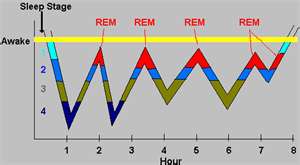A California University study has found that sleeping on problem really does help because dreaming provides overnight therapy for painful memories.
Now scientists have found that dreaming, which is the Rapid Eye Movement (REM) phase of sleep is actually essential to help us cope with inner trouble.
Brain scans showed that after sleeping, the emotional center of the brain becomes less active while areas that govern rational thought take over, helping us to get over painful experiences from the previous day.
The study could explain why post-traumatic stress disorder victims, who typically suffer from disturbed sleep, have severe difficulty overcoming painful memories, experts said.
Researchers from the University of California, Berkeley, found our brains process emotional experiences during dreams and this takes the painful edge off difficult memories.
MRI scans showed sleep caused a dramatic reduction in reactivity in the amygdala, a part of the brain that processes emotions. This allowed the brain’s ‘rational’ prefrontal cortex to regain control of the participants’ emotional reactions.
In addition, overnight recordings of the participant’s electrical brain activity showed levels of stress neurochemicals reduced during sleep.
Matthew Walker, senior author of the study, said dreaming “provides us with a form of overnight therapy, a soothing balm that removes the sharp edges from the prior day’s emotional experiences.
Els van der Helm, a doctoral student who led the study, said: “During REM sleep, memories are being reactivated, put in perspective and connected and integrated, but in a state where stress neurochemicals (chemicals in the brain) are beneficially suppressed.”
The researchers said the study, published in the Current Biology journal, could explain why blood pressure drugs which suppress stress signals in the brain during sleep have proved effective in some post-traumatic stress disorder patients, and may lead to new treatments for sleep disorders and mental illness.
